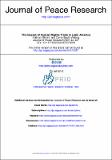| dc.description.abstract |
Since the 1980s, states have been increasingly addressing past human rights violations using multiple tran- sitional justice mechanisms including domestic and international human rights trials. In the mid-1980s, scholars of transitions to democracy generally concluded that trials for past human rights violations were politically untenable and likely to undermine new democracies. More recently, some international relations experts have echoed the pessimistic claims of the early ‘trial skeptics’ and added new concerns about the impact of trials. Yet, relatively little multicountry empirical work has been done to test such claims, in part because no database on trials was available. The authors have created a new dataset of two main transitional justice mechanisms: truth commissions and trials for past human rights violations. With the new data, they document the emergence and dramatic growth of the use of truth commissions and domestic, foreign, and international human rights trials in the world. The authors then explore the impact that human rights trials have on human rights, conflict, democracy, and rule of law in Latin America. Their analysis suggests that the pessimistic claims of skeptics that human rights trials threaten democracy, increase human rights vio- lations, and exacerbate conflict are not supported by empirical evidence from Latin America |

